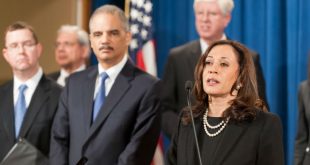 Ken Blackwell didn’t publish a column this week, but he co-wrote an article published in the Wall Street Journal on Sunday.
Ken Blackwell didn’t publish a column this week, but he co-wrote an article published in the Wall Street Journal on Sunday.
Blackwell and Edwin Meese III take on the Obama administration’s efforts to portray common-sense voting laws as racist tactics to keep blacks from voting.
As a former U.S. attorney general under President Reagan, and a former Ohio secretary of state, we would like to say something that might strike some as obvious: Those who oppose photo voter-ID laws and other election-integrity reforms are intent on making it easier to commit vote fraud.
That conclusion is inescapable, given the well-established evidence that voter-ID laws don’t disenfranchise minorities or reduce minority voting, and in many instances enhance it, despite claims to the contrary by Mr. Holder and his allies. As more states adopt such laws, the left has railed against them with increasing fury, even invoking the specter of the Jim Crow era to describe electoral safeguards common to most nations, including in the Third World.
Ascribing racial animus to people who are trying to safeguard democratic integrity is a crude yet effective political tactic that obscures the truth. But there’s something even worse than name-calling: legal interference from Washington with valid laws.
Section 5 of the Voting Rights Act of 1965 required mostly southern states to seek U.S. Department of Justice approval, or “preclearance,” to change voting procedures. A Texas utility district created in 1986 challenged the preclearance law on the grounds that the 40-year-old section was outdated. In 2009, the U.S. Supreme Court declined to rule on the constitutionality of Section 5 but held the utility district exempt.
In last year’s Shelby County v. Holder, the court ruled that Section 4(b), which lays out the formula for determining which districts are subject to Section 5, was unconstitutional. Blackwell and Meese point out an under-reported aspect of the voting rights issue:
What has been lost in media coverage is that the court rightly left untouched Sections 2 and 3, which together give the federal government ample power to enforce a national ban on racial discrimination in voting. Section 2 bars intentional discrimination as well as racially discernible “results” based on a court review. Section 3 empowers a court to pre-clear any changes if the court finds intentional discrimination. Following the Shelby ruling, Mr. Holder proved the point by invoking Section 2 to sue Texas and North Carolina.
In other words, the voting rights of Americans of all colors are protected, despite liberals’ implication that blacks or “poor” people are too stupid to go to the DMV for a photo ID if they don’t already have one. And, as the authors note, people who don’t produce ID on voting day can use a provisional ballot. Also under-reported: “Minority voting in Georgia also increased significantly under its photo-ID law, which took effect statewide in 2008.”
The Supreme Court has already spoken on the issue, ruling in 2008 that requiring voters to present photo ID doesn’t violate the U.S. Constitution.
 Black Community News News and Commentary for Christians
Black Community News News and Commentary for Christians



